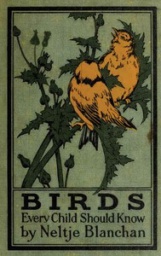

Birds Every Child Should Know (1907)
by Neltje Blanchan


No bird, except the wren, is more cheerful than the chickadee, and his cheerfulness, fortunately, is just as "catching" as measels. None will respond more promptly to your whistle in imitation of his three very high, clear call notes, and come nearer and nearer to make quite sure you are only a harmless mimic. He is very inquisitive. Although not a bird may be in sight when you first whistle his call, nine chances out of ten there will be a faint echo from some far distant throat before very long; and by repeating the notes at short intervals you will have, probably, not one but several echoes from as many different chickadees whose curiosity to see you soon gets the better of their appetites and brings them flying, by easy stages, to the tree above your head. Where there is one chickadee there are apt to be more in the neighbourhood; for these sociable, active, cheerful little black-capped fellows in gray like to hunt for their living in loose scattered flocks throughout the fall and winter. When they come near enough, notice the pale rusty wash on the sides of their under parts which are more truly dirty white than gray. Chickadees are wonderfully tame: except the chipping sparrow, perhaps the tamest birds that we have. Patient people, who know how to whistle up these friendly sprites, can sometimes draw them close enough to touch, and an elect few, who have the special gift of winning a wild bird's confidence, can induce the chickadee to alight upon their hands. Blessed with a thick coat of fat under his soft, fluffy gray feathers, a hardy constitution and a sunny disposition, what terrors has the winter for him? When the thermometer goes down, his spirits seem to go up the higher. Dangling like a circus acrobat on the cone of some tall pine tree; standing on an outstretched twig, then turning over and hanging with his black-capped head downward from the high trapeze; carefully inspecting the rough bark on the twigs for a fat grub or a nest of insect eggs, he is constantly hunting for food and singing grace between bites. His day, day, day, sung softly over and over again, seems to be his equivalent for "Give us this day our daily bread."🏁
Global Leaderboard
| # | Player | Time | Duration | Accuracy | WPM | pp | |
|---|---|---|---|---|---|---|---|
| 1 | |||||||
| 2 | |||||||
| 3 | |||||||
| 4 | |||||||
| 5 | |||||||
| 6 | |||||||
| 7 | |||||||
| 8 | |||||||
| 9 | |||||||
| 10 |


No bird, except the wren, is more cheerful than the chickadee, and his cheerfulness, fortunately, is just as "catching" as measels. None will respond more promptly to your whistle in imitation of his three very high, clear call notes, and come nearer and nearer to make quite sure you are only a harmless mimic. He is very inquisitive. Although not a bird may be in sight when you first whistle his call, nine chances out of ten there will be a faint echo from some far distant throat before very long; and by repeating the notes at short intervals you will have, probably, not one but several echoes from as many different chickadees whose curiosity to see you soon gets the better of their appetites and brings them flying, by easy stages, to the tree above your head. Where there is one chickadee there are apt to be more in the neighbourhood; for these sociable, active, cheerful little black-capped fellows in gray like to hunt for their living in loose scattered flocks throughout the fall and winter. When they come near enough, notice the pale rusty wash on the sides of their under parts which are more truly dirty white than gray. Chickadees are wonderfully tame: except the chipping sparrow, perhaps the tamest birds that we have. Patient people, who know how to whistle up these friendly sprites, can sometimes draw them close enough to touch, and an elect few, who have the special gift of winning a wild bird's confidence, can induce the chickadee to alight upon their hands. Blessed with a thick coat of fat under his soft, fluffy gray feathers, a hardy constitution and a sunny disposition, what terrors has the winter for him? When the thermometer goes down, his spirits seem to go up the higher. Dangling like a circus acrobat on the cone of some tall pine tree; standing on an outstretched twig, then turning over and hanging with his black-capped head downward from the high trapeze; carefully inspecting the rough bark on the twigs for a fat grub or a nest of insect eggs, he is constantly hunting for food and singing grace between bites. His day, day, day, sung softly over and over again, seems to be his equivalent for "Give us this day our daily bread."🏁